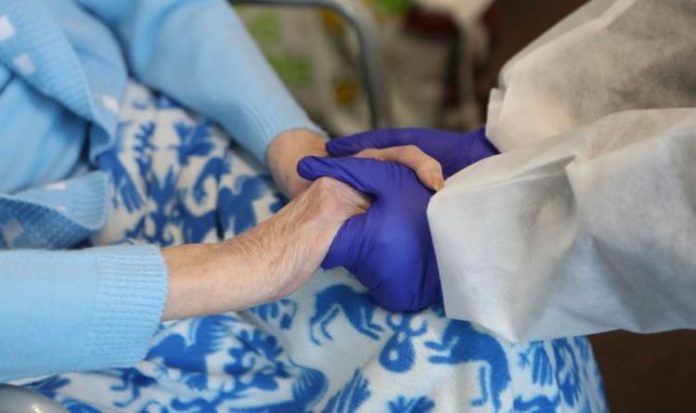The Joint Committee on Human Rights – a powerful select committee of MPs and peers – presented it to Health Secretary Matt Hancock and Prisons Minister Lucy Frazer with a letter laying bare the scandal of continued visitation bans on those in care homes, hospitals and prisons. It wants families legally designated “essential carers”, guaranteeing them unfettered and regular access. The committee said “face to face contact” meant indoor contact without fixed physical barriers, like plastic partitions. But it allows hugging, hand holding and touch where both loved ones and residents wear personal protective equipment. The committee, chaired by Labour grandee Harriet Harman, said urgent law changes were needed because of the “emotional and psychological needs” of both families and lonely loved ones.
It said: “It is understandable, after tens of thousands of care home deaths, there should be caution.
“But, as the Government has said, relatives must now be reunited with their loved ones in care homes and that needs to be backed up by law.”
It requires care homes to allow visits by a “person significant to the service user” and mirrors legislation in Ontario, Canada, where a close relative is regarded part of the care team for the purpose of visits and tests.
The move – exclusively revealed by the Daily Express on Monday – comes after Ms Harman said blanket bans were contrary to the rights of both patients and their families under the Human Rights Act.
She said: “It takes a team to care for an older person in residential care: dedicated staff in the home and loving family visiting. It’s time we changed the law to recognise that.”
The committee is backed by large numbers of MPs whose constituents have bombarded them with harrowing stories of being denied access to relatives who do not have long to live.
Despite rapid testing and guidelines aimed at reuniting families many providers continue to lock loved ones out. The crisis has denied tens of thousands of families the chance to say a final goodbye to more than 30,000 care home residents who have perished from the virus.
The situation is particularly grave for those whose relatives have dementia. Seven in ten of the 400,000 care home residents in Britain have the disease.
The push for emergency changes is backed by campaign group Rights for Residents and its tens of thousands of members.
They include actress Ruthie Henshall who told this paper of the “guilt and unbearable pain” at knowing her 87-year-old mother Gloria, who has dementia, is dying while she is banned from seeing her.
Ruthie has not been able to enjoy a meaningful visit since lockdown and the last time she spoke to her was in April when her father died.
The I’m A Celebrity star, 53, said: “It’s worse than guilt. It’s actually unbearable pain because I know my mother is dying. A little bit of her is going every day, every week, and I can’t make her life better.
“I feel like I am mourning the loss of someone who has not actually died.
“And I feel in perpetual grief, stuck in a cycle that you can’t do anything about because there is no end to this.”
Jenny Morrison, 55, who founded Rights for Residents with partner Diane Mayhew, said: “The death toll from Covid continues to rise but thousands are also dying from loneliness and isolation.
“Here lies the real scandal as many of these excess deaths could be avoided if people were given a reason to live. The only time our loved ones will get to hold our hands is while taking their last breath.
“How can this be humane? For those unable to communicate a hug is worth a thousand words.
“Having had the jab, what they are desperate for is an injection of compassion, love and humanity that may just save their life.”
Informal carers should be bumped up the Covid vaccine priority list to protect the NHS, campaigners have demanded.
One unpaid carer contracting the virus means at least two people needing extra support.
There are 13.6 million people caring for disabled children, frail elderly parents or other ill relatives vulnerable to the coronavirus.
Jan Tregelles, chief executive of charity Revitalise, said: “The NHS will be inundated if carers can no longer care for their loved ones.”







